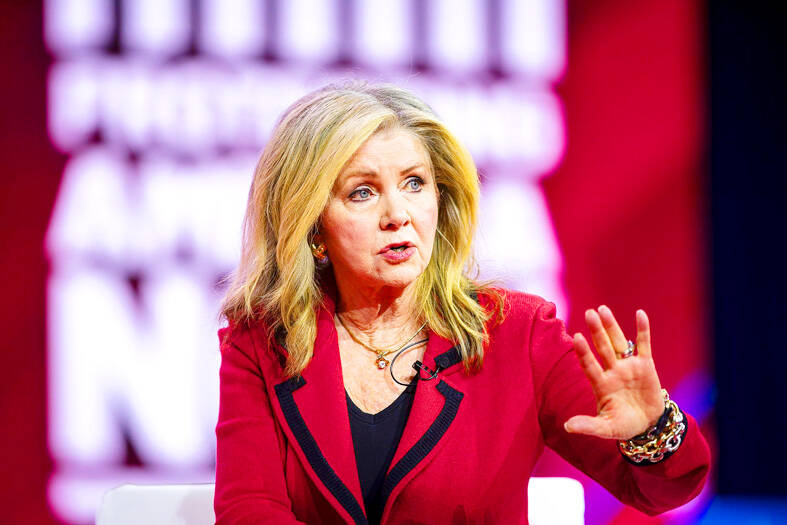A US senator has reintroduced a bill aimed at authorizing Washington to lend or lease defense equipment to Taipei to deter Chinese aggression against Taiwan.
US Senator Marsha Blackburn on Thursday introduced the Taiwan Democracy Defense Lend-Lease Act, cosponsored by senators Rick Scott and Marco Rubio.
The content of the bill is the same as a bill Blackburn sponsored last year that failed to make it through the US Senate.

Photo: Bloomberg
Under the bill, Washington would be permitted to lend or lease defense equipment to Taiwan with interest, as part of efforts to protect the country from “potential aggression carried out by the People’s Liberation Army of China.”
Acts of aggression by Beijing include a full or partial naval blockade of Taiwan, an amphibious assault or ground invasion, or a seizure of one or more of Taiwan’s outlying islands, among others, the bill states.
It stipulates that the US military should report to the US Congress about the defense items it deems “appropriate” to loan or lease to Taiwan within 90 days of the bill being signed into law.
No later than 60 days after the bill is enacted, the US president should establish expedited procedures for the delivery of loaned or leased defense items to Taiwan, it states.
Blackburn, who visited Taiwan and met with President Tsai Ing-wen (蔡英文) in August last year, said in a statement that the bill aims to “ensure Taiwan has the capacity to defend itself and strengthen the United States’ commitment to preserving freedom around the globe.”
US representatives Michelle Steele and Jimmy Panetta introduced a companion bill on March 1.
Steele said in a statement that the passage of the bill “will send an unmistakable message” to the Chinese Communist Party (CCP) that the US “stands with our allies and is prepared to arm Taiwan with the tools it needs to defend itself from a CCP attack.”
A US funding bill signed into law by US President Joe Biden in December last year authorizes Washington to provide up to US$2 billion in direct loans to Taiwan for military purposes under the US Foreign Military Financing Program.
Taipei at that time said it would work closely with all branches of the US government to ensure those provisions are realized in line with its national policy.
Separately, French President Emmanuel Macron and British Prime Minister Rishi Sunak on Friday issued a joint declaration, which, among other things, called for the countries to “reaffirm the importance of peace and stability across the Taiwan Strait and call for the peaceful resolution of cross-Strait issues.”
It also said that France and the UK would “coordinate on their concerns regarding China’s challenge to the rules-based international order, and will work with partners to manage increasing systemic rivalry and competition.”

ENDEAVOR MANTA: The ship is programmed to automatically return to its designated home port and would self-destruct if seized by another party The Endeavor Manta, Taiwan’s first military-specification uncrewed surface vehicle (USV) tailor-made to operate in the Taiwan Strait in a bid to bolster the nation’s asymmetric combat capabilities made its first appearance at Kaohsiung’s Singda Harbor yesterday. Taking inspiration from Ukraine’s navy, which is using USVs to force Russia’s Black Sea fleet to take shelter within its own ports, CSBC Taiwan (台灣國際造船) established a research and development unit on USVs last year, CSBC chairman Huang Cheng-hung (黃正弘) said. With the exception of the satellite guidance system and the outboard motors — which were purchased from foreign companies that were not affiliated with Chinese-funded

PERMIT REVOKED: The influencer at a news conference said the National Immigration Agency was infringing on human rights and persecuting Chinese spouses Chinese influencer “Yaya in Taiwan” (亞亞在台灣) yesterday evening voluntarily left Taiwan, despite saying yesterday morning that she had “no intention” of leaving after her residence permit was revoked over her comments on Taiwan being “unified” with China by military force. The Ministry of the Interior yesterday had said that it could forcibly deport the influencer at midnight, but was considering taking a more flexible approach and beginning procedures this morning. The influencer, whose given name is Liu Zhenya (劉振亞), departed on a 8:45pm flight from Taipei International Airport (Songshan airport) to Fuzhou, China. Liu held a news conference at the airport at 7pm,

GRIDLOCK: The National Fire Agency’s Special Search and Rescue team is on standby to travel to the countries to help out with the rescue effort A powerful earthquake rocked Myanmar and neighboring Thailand yesterday, killing at least three people in Bangkok and burying dozens when a high-rise building under construction collapsed. Footage shared on social media from Myanmar’s second-largest city showed widespread destruction, raising fears that many were trapped under the rubble or killed. The magnitude 7.7 earthquake, with an epicenter near Mandalay in Myanmar, struck at midday and was followed by a strong magnitude 6.4 aftershock. The extent of death, injury and destruction — especially in Myanmar, which is embroiled in a civil war and where information is tightly controlled at the best of times —

Taiwan was ranked the fourth-safest country in the world with a score of 82.9, trailing only Andorra, the United Arab Emirates and Qatar in Numbeo’s Safety Index by Country report. Taiwan’s score improved by 0.1 points compared with last year’s mid-year report, which had Taiwan fourth with a score of 82.8. However, both scores were lower than in last year’s first review, when Taiwan scored 83.3, and are a long way from when Taiwan was named the second-safest country in the world in 2021, scoring 84.8. Taiwan ranked higher than Singapore in ninth with a score of 77.4 and Japan in 10th with